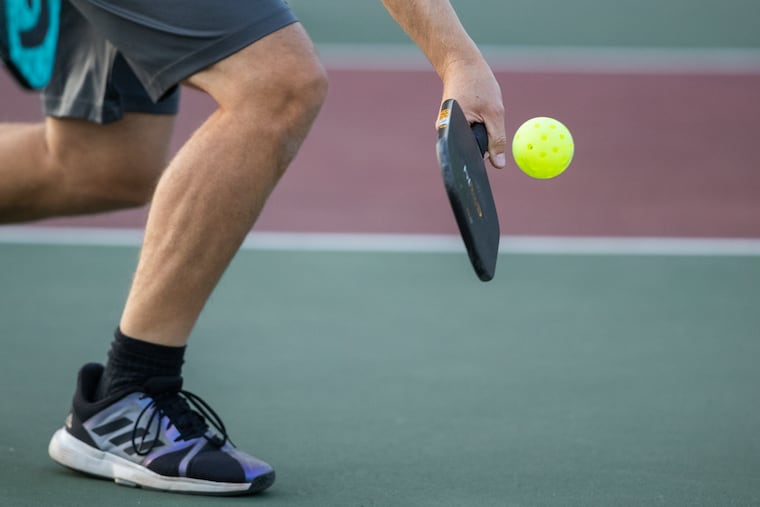Pickleball court plan stirs frustrations in Lower Merion
Construction of pickleball courts in Bryn Mawr park have frustrated some Lower Merion Township residents.

It’s been described as a popcorn-like pop pop pop sound that comes in sporadic rhythms, a hollow ball hitting paddles at decibels sometimes higher than average street noise.
It’s the United States’ fastest growing sport — pickleball — and plans to add additional courts to a quiet Lower Merion park have stirred opposition among neighbors in the Main Line community.
As the township advances plans to construct four pickleball courts in Ashbridge Park, Bryn Mawr neighbor Rita Auritt launched a Change.org petition pushing back on the proposal.
There isn’t much time left. Lori Jennings, a spokesperson for Lower Merion Township, said the courts are under construction and will be completed in May.
Ashbridge Park, tucked in a neighborhood between Rosemont and Bryn Mawr Colleges, already houses two courts for both tennis and pickleball.
Auritt’s petition alleges that local officials did “not contact neighbors and users of the park regarding the decision to construct [the courts] in the park and has not demonstrated that it or its staff has studied or engaged in any studies of the noise, parking, traffic, and other issues.” The petition had 148 signatures Tuesday afternoon.
Auritt did not immediately respond to a request for comment.
The township’s board of commissioners has met with the neighborhood’s civic association and a group of park caretakers to “listen to concerns and answer questions,” according to Jennings, adding that members of the public are welcome to speak at monthly commissioners’ meetings.
Jennings acknowledged neighbors’ concern over noise. But, if anything, residents who have attended meetings are enthusiastic about the plan, she said.
“I can’t even count how many times folks have come to ask for pickleball courts,” Jennings said.
Lower Merion is just the latest in a smattering of communities in the Philadelphia area and across the country where some residents oppose the rise of the popular paddle sport.
A 2023 New York Times report found that residents in neighborhoods from Virginia to Arizona were frustrated by the noise, launching their own petitions in addition to filing police reports and in some cases, civil lawsuits.
“It’s like having a pistol range in your backyard,” one Massachusetts resident told the Times.
A pickleball court at the Water Tower Recreation Center in Chestnut Hill drew similar complaints, an Inquirer report found in 2022.
Hearing pickleball smacks all day “just drains the energy out of you,” one Chestnut Hill neighbor said of the court, located just yards from a strip of rowhouses. Other neighbors considered filing a lawsuit against the city, arguing that the frequent strikes were violating Philadelphia’s noise ordinance.
City officials responded by limiting court access at later hours and proposing new courts in a less-populated area nearby. Meanwhile, a neighborhood association considered purchasing sound proof curtains to envelop the playing area.
Pickleball in Ashbridge Park will be restricted on Sundays, when courts will be locked, according to Jennings. Noise remediation efforts include vegetation and plants that can “buffer noise if it needs to be buffered,” she added.
Auritt’s petition also cites concerns over the township’s plan to renovate Ashbridge Park’s historic house into a recreational center for seniors.
In tandem with the new courts, the changes would “run counter to the passive nature of the park. [and] will inappropriately change the pastoral nature of the park and its open spaces,” Auritt wrote.
The neighbor suggested that Lower Merion officials withdraw their plan for the courts, and halt their proposal for the recreational center until a survey could determine how frequent use would impact the surrounding community.